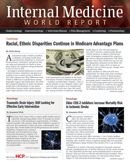Publication
Article
Internal Medicine World Report
Insight into Cardiovascular Disease Risk, Lupus-Related Arthritis Treatment, Stroke-Associated Mortality Risk, and More
Author(s):
This month's issue of Internal Medicine World Report (IMWR) features another collection of studies selected by our physician editor for their potential impact on clinical practice.

As the authors of a study included in the “Cardiology” section this month note, the pooled cohort equations from the recent American College of Cardiology/American Heart Association (ACC/AHA) Guideline on the Assessment of Cardiovascular Risk have overestimated cardiovascular risk in multiple external cohorts. The reasons for this are unclear. To see if they could identify a possible cause, researchers compared predicted vs. actual rates of atherosclerotic cardiovascular disease (defined as myocardial infarction, stroke, or death due to cardiovascular cause) among participants of the Women’s Health Study. Their objective was to determine whether increased use of statins over time, incident coronary revascularization procedures, or underascertainment of vascular events explain overestimation of risk. They reported that, even after adjusting for intervention effects of statins and revascularization as well as hypothetical confounding by indication, ratios of predicted to observed rates remained significantly higher across risk groups.
The expansion of the use of testosterone replacement therapy beyond the traditional indication of patients with primary and secondary hypogonadism due to primary testicular or pituitary disorders (ie, “classic” hypogonadism) to include those with age-related testosterone decline (“low T”) has been fascinating to observe. An article in the “Endocrinology” section traces the evolution of this process, and provides information on recent concerns over cardiovascular risk and safety issues among patients on testosterone replacement therapy (TRT), including a recap of the actions and findings of an FDA advisory panel that looked into this matter, as well as “the appropriateness of the current indication and labeling of TRT products.
In the “Rheumatology” section, readers will find a summary of an evidence-based answer to a straightforward clinical question: “What treatment relieve arthritis and fatigue associated with systemic lupus erythematosous (SLE)?” According to the results of their review of the available literature, the authors reported that treatment with hydroxychloroquine and chloroquine improve arthritis-related symptoms, while treatment with methotrexate can reduce arthralgias but at the cost of higher rates of adverse events. NSAIDs, corticosteroids, and omega-3 fatty acids may also provide some relief, though the evidence for efficacy is weaker. They found no strong evidence showing any drug treatment provided significant relief from SLE-related fatigue.
Underscoring the concept of “herd immunity,” results from a study in the “Infectious Disease” section found that children who are vaccinated for influenza indirectly reduced others’ chances of contracting the disease. A press release that accompanied publication of the study results noted that in one school district, when half of 5- to 17-year-old children received vaccinations at school, the entire age group’s flu rates decreased by 79 percent. Rates among 0-4 year olds fell by 89 percent, despite the fact that this group was not included in the school-based vaccinations. Among all non-school-aged residents, rates of influenza-like illness decreased by 60 percent.
Finally, the “Neurology” section features a summary of a Danish study that found increased mortality after ischemic stroke in patients taking older NSAIDs that inhibit COX-2 (eg, diclofenac and etodolac). The authors looked at all first-time stroke hospitalizations in Denmark between 2004 and 2012 and stratified patients by NSAID use (, ie, current, former, and non-use). They found that Ischemic stroke victims who had started on older COX-2 inhibitors within 60 days of admission were 42% more likely to die within 30 days compared to patients who were not taking NSAIDs other than aspirin. They also reported that former users of etodolac or diclofenac were not at increased risk, nor were patients who were former or current users of nonselective NSAIDs.
Please read through these studies and let us know if your clinical experience confirms, contradicts, or differs from the conclusions reached by the investigators. As always, we are interested in your feedback as to how we can improve the content offered in IMWR. We are also looking for potential contributors and writers who want to share their knowledge and experience with their colleagues in internal medicine. Write to us at Editors@hcplive.com.
Thank you for reading.
Mike Hennessy
CEO & Publisher

2 Commerce Drive
Cranbury, NJ 08512
All rights reserved.





